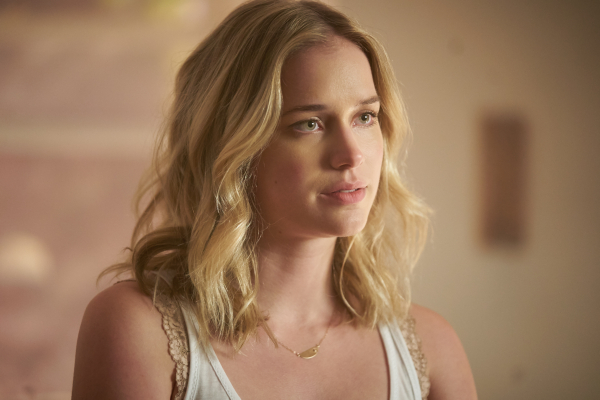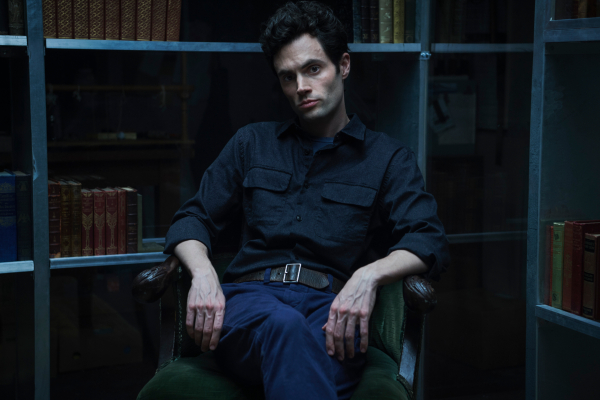On the surface, Lifetime’s new series You may appear to be another disturbing tale of a stalker going to extreme lengths to win over the object of his obsession. While this may be disconcerting, especially in the current climate, it is more a commentary on unhealthy behaviours that were romanticized by pop culture in the 80s and 90s. The series — based on the novel by Caroline Kepnes, and executive produced by Sera Gamble and Greg Berlanti — takes those romantic comedy tropes and strips them to their ugly skeletons.
During the ATX Television Festival, I sat down with You stars Elizabeth Lail and Penn Badgley. They shared some insight into their characters, Beck and Joe, and discussed why viewers should take this journey with them.
You premieres tonight at 10/9c on Lifetime, and for some further insight into the series, listen to my Fem TV interview with Sera Gamble and Caroline Kepnes.
What was it about You that intrigued each of you the most? And was there a specific moment when you knew you had to be a part of it?
Elizabeth: I was just grateful to be considered for this project. I don’t often have the luxury to think, “Oh, I need this and I’m going to fight for this.” I have to do the work on the script, and hope that I have chemistry with who they’ve already cast. For me, it’s a feeling. It’s like a cosmic alignment with the creators, the other actors and the script. You can feel it when you first start working on a scene.
Penn: For me, it was a constant learning process. I was able to witness time and again how I was glad I decided to be a part of it. But there was not a moment where I knew that it was something I had to be a part of. That’s significant because I remained conflicted throughout the entire stretch of shooting this series. I told Sera [Gamble] that I’m going to be this way even if it goes however many seasons.
There’s something about this that really troubles me. I don’t understand the impetus as much as Greg [Berlanti], Sera and Caroline [Kepnes], but my conversations with them and their understanding is what compelled me. It was Sera and Greg who helped me see what I might contribute to the show. Caroline [created] a remarkable piece of art that I find so chilling, and I was really questioning whether or not I could bring this to life in a meaningful and responsible way. We discovered how it takes the essence of the book and then actually reconceptualizes it enough that there might be more ways to make Joe human.
Beyond the first episode, how does the dynamic between Beck and Joe evolve?
Elizabeth: Beck is a writer. Joe loves books. There’s an immediate attraction and he seems ideal, but she’s also seeing someone else who she’s getting something different from. Someone who is successful and can take her to dinner. Each dream guy comes with different benefits. She’s a young girl exploring the dating world. She’s drawn to Joe and throughout the series, she goes back and forth with him to decide if that’s what she wants because it’s not enough. Beck wants to be loved and has a desire to be loved by just one person. She realizes it’s not enough, so she’s exploring others. She presents Joe with the challenge that he’s one version of the dream that she wants, but it doesn’t end up fulfilling her in a romcom sort of way.
Penn: The thing that really sticks with me is how, in many ways, Joe follows the logic as he understands it. Romance as understood culturally through things like romcoms, and it’s very literal, especially as the series goes on. You see him continue to conform to these tropes that we’ve seen time and time again in movies and books. I think that culturally, we’ve developed an entire fantasy life that is defined and informed and indoctrinated by frigging movies. We don’t know how much we are thinking for ourselves when we define love and romance. Joe believes he is in love with Beck and romancing her, but he’s not. He’s obsessive, lustful, and possessive. None of this is love. It’s something else.
I find myself constantly questioning the things that I romanticized in my high school and college days. In hindsight, I recognize how they warped my views on love and relationships.
Penn: I was listening to a lot of Prince and Michael Jackson, which is a glittery world of perfect production, incredible performances, and obsession with love. The lyrics to [Jackson’s] “Human Nature” from Thriller is really pertinent to this. That song is about a young man yearning for the kind of love and communion with another that is so intense that he’s effectively stalking her. And he believes that because he’s doing this, he is actually just demonstrating a more bold brand of love than anyone else. [The girl] likes it in the song because it’s a creation. In reality, we’re starting to recognize more and more that this is not actually the way people should behave. That love in pop songs is obsession. It’s unhealthy, unsustainable, and manic. And it often can end in violence if you follow the logic too closely. This is what Joe is doing. He working with some bad information, and ultimately [his actions are] on him, but he’s taking this stuff from our world coming to conclusions that lack a certain human component., but they don’t lack intelligence in and they don’t lack the logic.
People often used to say about Blair and Chuck on Gossip Girl that “I just want somebody to be the Chuck to my Blair.” [Chuck and Blair] would murder each other! They did some of the most unhealthy and abusive things to one another. In real life, their love would not be sustained. It’s a fantasy and these are things that people often miss. As troubling as You is, I find it to be, paradoxically at the outset, more emotionally responsible than many.
For viewers who find the first episode off putting, why do you think should they continue on this journey with your characters?
Elizabeth: The show is, in my mind, a severe reflection of our current society and takes it to a monstrous level. The fact of the matter is that we’ve been forgiving of that level for quite some time. Maybe there’s some value in reflecting that back to someone. It turns [the romantic comedy] on its head. Penn and I were constantly discussing what we were putting out into the world. There is a lot of catharsis throughout the show for the different characters.
Penn: It’s so much more than the first episode. By the end of the first episode, you think you know what you’re getting into, but it does change a lot. The season is 10 episodes, and you’re getting a lot of different stories within each one. It changes more than a lot of television shows do. There are substantial events, a lot of time passes, lots of change happens. Those changes are meaningful and lasting. They’re irrevocable, and you see the characters go through a lot.
As dark as it is, Joe’s sensitivity and heart is revealed a lot more towards the end of the season. It’s not just him being romantic and seductive on one hand, and then being duplicitous on the other. You start to see how these are not two different sides, but that he’s a whole person and you start to understand how he sees himself that way. And the same happens with Beck.
Elizabeth: Yes, she’s not just the pretty, nice girl. Like anyone, there’s so many layers to all of the characters that I keeps it very grounded and real.
Penn: This is not a cautionary tale. It’s not part of what we’re doing. I see it as a social experiment. Joe has to continue going further than we want him to. From the first moment, he’s not a good person. He crosses the line from the outset. From the first scene, from the first word, he’s objectifying Beck in a way that is already extremely possessive.
Photos Courtesy of Lifetime




